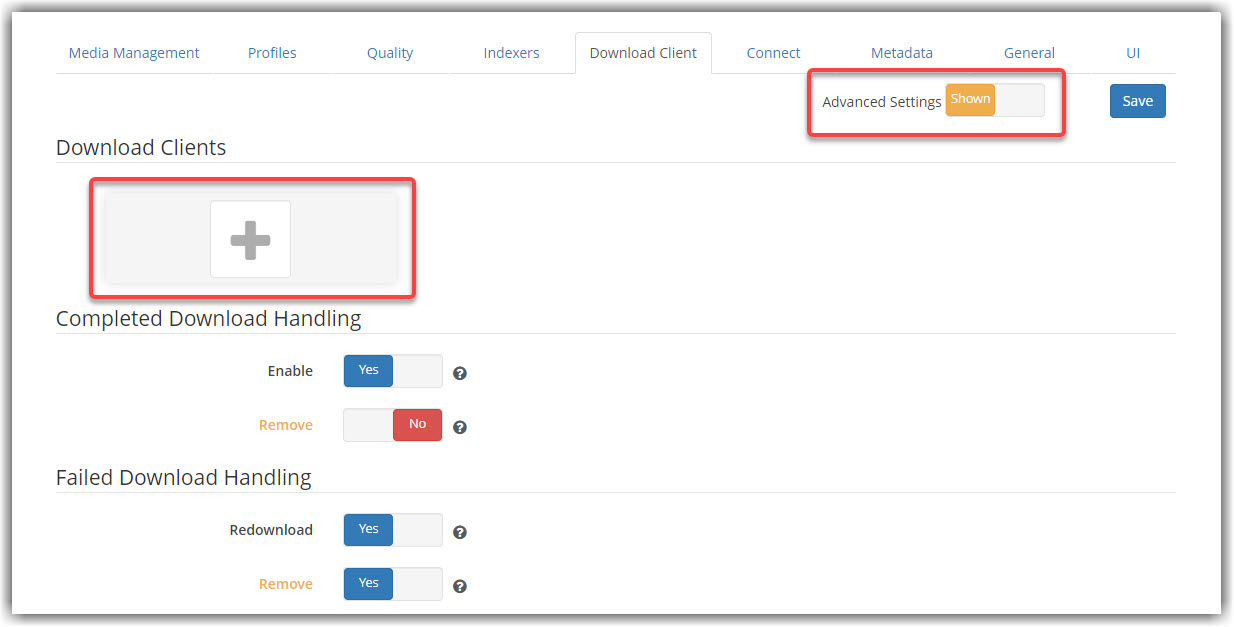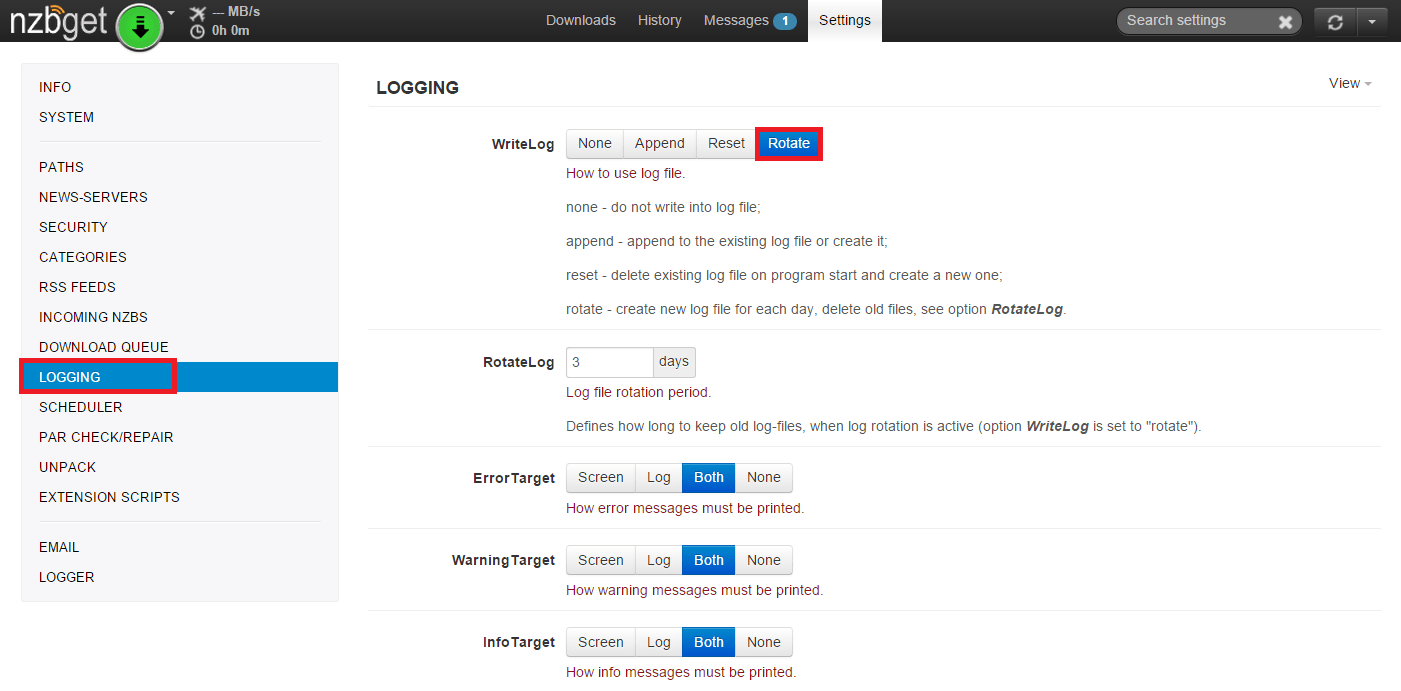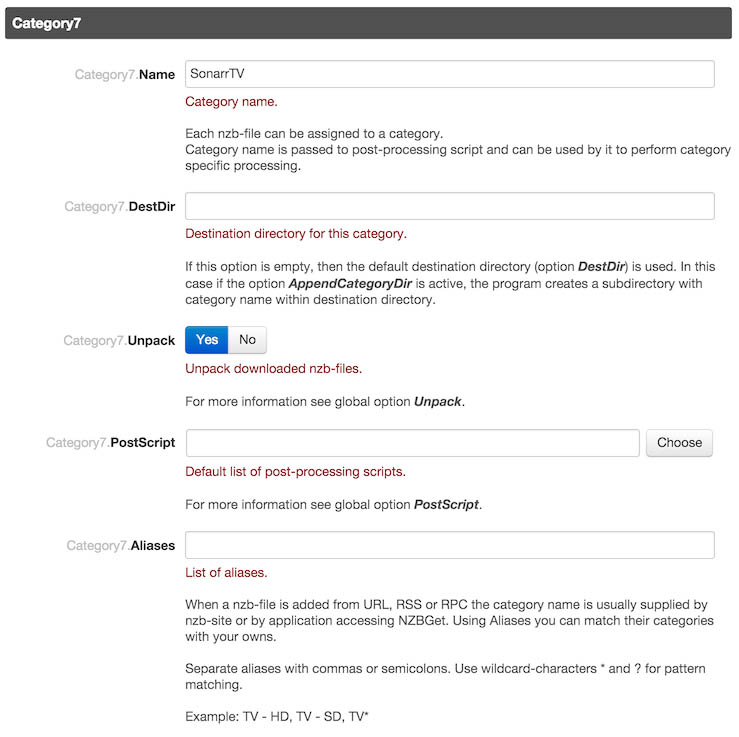

- #How to configure sonarr with nzbget 1080p#
- #How to configure sonarr with nzbget tv#
- #How to configure sonarr with nzbget download#
- #How to configure sonarr with nzbget torrent#
Sonarr & Radarr already have integration with them, meaning they rely on each service API to pass on downloads, request download status and handle finished downloads.īoth are very standard and popular tools. NZBGet handles Usenet (newsgroups) binary downloads.īoth are daemons coming with a nice Web UI, making them perfect candidates for being installed on a server.Sonarr and Radarr are plugged to downloaders for our 2 different systems:

Handle bittorrent and usenet downloads with Deluge and NZBGet Then the download is passed on to another set of tools.
#How to configure sonarr with nzbget 1080p#
non-blacklisted 1080p release with enough seeds). The best release matching your criteria is selected by Sonarr/Radarr (eg. It searches and parse information from heterogeneous websites.
#How to configure sonarr with nzbget torrent#
You can consider it as a local proxy API for the most popular torrent indexers. That's why we'll be using another tool called Jackett. However this common protocol does not really exist for torrent indexers. This is a pretty common feature for newsgroups indexers that respect a common API (called Newznab). Think browsing the Pirate Bay programmatically. Indexers are APIs that allow searching for particular releases organized by categories. At some point I might switch to torrents only, which work really fine as well.įiles are searched automatically by Sonarr/Radarr through a list of indexers that you have to configure. I'm using both systems simultaneously, torrents being used only when a release is not found on newsgroups, or when the server is down. That's the new player in town, for which support has improved a lot lately. Often requires a paid subscription to newsgroup servers. That's the historical and principal option, for several reasons: consistency and quality of the releases, download speed, indexers organization, etc. Sonarr and Radarr can both rely on two different ways to download files: Search for releases automatically with Usenet and torrent indexers Radarr is the exact same thing, but for movies. When the download is over, Sonarr moves the file to the appropriate location ( my-tv-shows/show-name/season-1/01-title.mp4), and renames the file if needed. No human intervention is required for all the episodes to be released from now on. But it also handle upcoming episodes and seasons on-the-fly. Sonarr triggers download batches for entire seasons. It also takes care of upgrading your existing episodes if a better quality matching your criterias is available out there.
#How to configure sonarr with nzbget tv#
It compares what you have on disk with the TV show release schedule, and triggers download for missing episodes.

Sonarr will automatically take care of analyzing existing episodes and seasons of this TV show. You can specify a language and the required quality (1080p for instance). Using Sonarr Web UI, search for a TV show by name and mark it as monitored. Monitor TV shows/movies with Sonarr and Radarr The common workflow is detailed in this first section to give you an idea of how things work. They're all open-source, and deployed as Docker containers on my Linux server. How does it work? I rely on several tools integrated together. This is what I have set up at home to handle TV shows and movies automated download, sort and play.ĭisclaimer: I'm not encouraging/supporting piracy, this is for information purpose only. Organize libraries and play videos with Plex.Handle bittorrent and usenet downloads with Deluge and NZBGet.Search for releases automatically with Usenet and torrent indexers.Monitor TV shows/movies with Sonarr and Radarr.TV shows and movies download, sort, with the desired quality and subtitles, behind a VPN (optional), ready to watch, in a beautiful media player. One solution is to remove the TNAS Plex Server and use the official Plex docker image and then do a similar "link" from Sonarr to Plex (FYI: I did already create the same nzbget link from the sonarr container settings and used that for Sonarr to download the TV shows using nzbget.Sonarr / Radarr / Jackett / NZBGet / Deluge / OpenVPN / Plex My remaining issue is a problem with Sonarr in a container unable to talk to the Plex Server installed on the TNAS. I have it up and working and hope to produce some guides for a complete: Plex, NZBGet, Sonarr, and CouchPotato set-up on my TNAS F4-220. In CouchPotato settings for the downloader, I have the host as "nzbget:6789" - this is the container link name from the first item above.



 0 kommentar(er)
0 kommentar(er)
